Are you looking for a substitute for self-rising flour that won’t compromise on taste or texture? You’re in luck.
We will provide you with five excellent alternatives to self-rising flour that you can use to create delicious baked goods.
Read on to learn more about these handy substitutes.
What is Self-rising Flour?

Self-rising flour is a type of pre-mixed flour specifically designed to be simpler, quicker and easier to use when baking.
It is made from all-purpose flour, baking powder, and salt.
The addition of baking powder makes the self-rising flour ready to use out of the box and eliminates the need for additional ingredients in many recipes.
Self-rising flour can also be known as self-raising or self-addressing flour depending on where you are from geographically.
Using self-rising flour is an easy way for beginners to get into the home cooking game without having to measure and mix separate ingredients like other types of flours.
It offers several advantages, including a much shorter preparation time and no risk of added ingredients being too much or too little for a given recipe.
When using self-rising flour, you should remember that it contains baking powder, so it will have a strong leavening effect and should not be added in excessive amounts.
This will cause your baked goods to become too airy and might end up tasting overly salty if too much salt is added with this type of flower in the recipe.
Additionally, if an acidic ingredient like lemon juice or vinegar is present in your recipe, it will interact with the baking powder found in self rising flower which could affect the final product taste or texture.
A good rule of thumb when using this kind of flower is to start by adding only 50% (by weight) of what would otherwise be added plain regular all purpose four.
For example; If a recipe calls for two cups (240 g) each plain all purpose four and two teaspoons (11 g) baking powder then 15 tablespoons (90g) of self rising flower can be used instead.
It’s important to note that if you choose substitutes for self rising flour not all them result in such precise measurements so keep that mind when attempting this kind of recipe conversions or adjustments.
5 Best Self-rising Flour Substitutes to Consider
For those who don’t have self-rising flour on hand, not to worry.
Here are five substitutes to consider utilizing instead.
1 – All-purpose Flour, Baking Powder, and Salt
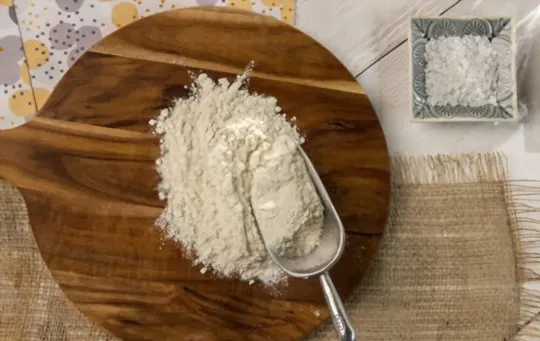
All-purpose flour, baking powder, and salt is the most popular and widely used substitute for self-rising flour.
For each cup of self-rising flour that is called for in a recipe, use one cup of all-purpose flour, 1 ½ teaspoons of baking powder, and ½ teaspoon of salt.
This combination works best in baked goods that call for a considerable amount of leavening such as cakes or muffins.
If using this alternative in quick bread recipes or pancakes, you may need to increase the amount of baking powder by an additional ¼ teaspoon for the best results.
When using this substitute it is important to remember to sift together the all-purpose flour, baking powder and salt before preparing your recipe for best results.
2 – Whole Wheat Pastry Flour and Baking Soda
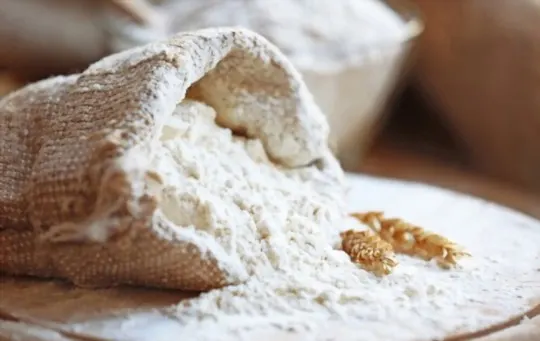
Whole wheat pastry flour is one of the best substitutes for self-rising flour.
It contains less protein and gluten than all-purpose flour, making it ideal for tender cakes and pastries.
When preparing dishes with whole wheat pastry flour, you also need to add baking soda, which is a basic ingredient in self-rising flour that helps doughs rise properly.
To prepare your own self-rising flour substitute with whole wheat pastry flour, mix 2 cups of pastry flour with 1 teaspoon of baking soda and ½ teaspoon of salt.
Use the same amount you would use of the self-rising variety called for in your recipe.
3 – Spelt Flour
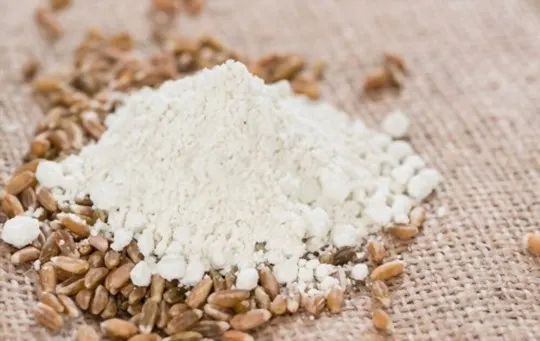
Spelt flour is a type of flour made from spelt, an ancient grain that is related to wheat.
Because it contains bran, the nutritional content of this flour is higher than that of regular wheat all-purpose flour.
As with cake flour, you must use additional leaveners when baking with spelt.
For each cup of spelt flour you are substituting, add 1 teaspoon baking powder and¼ teaspoon salt to the recipe for proper leavening and flavour.
Approximate measurements for other ingredients may vary, as this type of flour has higher absorbency levels than plain all-purpose wheat flours.
Also keep in mind that the resulting texture may be slightly more dense than if self-rising flour had been used in the recipe.
4 – Amaranth Flour
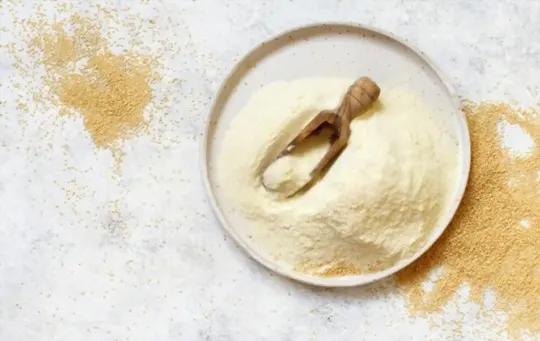
Amaranth flour is a great gluten-free substitute for self-rising flour, as it’s high in protein and fiber.
It also packs a punch when it comes to nutritional benefits such as calcium, magnesium and iron.
Amaranth flour can easily be made into a self-rising version by combining one cup of amaranth flour with two teaspoons of baking powder and one teaspoon of salt.
This combination should act as an appropriate replacement for one cup of self-rising flour in any recipe.
Be sure to sift together the ingredients until well combined before using them in your recipes.
5 – Biscuit Mix
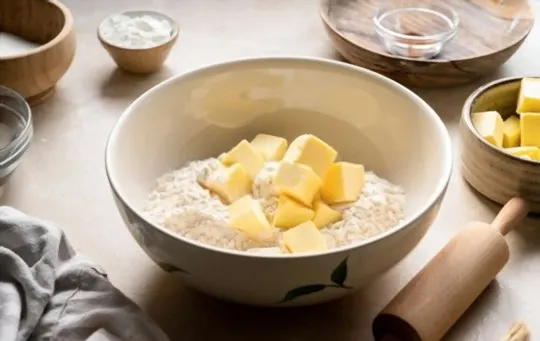
Biscuit Mix is made with a combination of all-purpose flour, baking powder and salt in the correct ratio for creating a self-rising flour substitute.
Make sure to read the label to check for added fat or other ingredients.
Biscuit Mix usually has roughly double the amount of baking powder compared to a self-rising flour mix and can thus produce lighter, fluffier baked goods.
It is great for creating biscuits or other quick breads such as pancakes or dumplings.
To make self-rising biscuit mix:
Combine:
- 2 cups all-purpose flour.
- 1 tablespoon baking powder.
- 1 teaspoon salt.
Mix until combined and store in an airtight container for future use.
Conclusion
In conclusion, it is important to find the right self-rising flour substitute if you don’t have any on hand.
There are five alternatives you can use: all-purpose flour with baking powder and salt, cake flour, plain yogurt or sour cream, club soda or sparkling water and club soda and baking powder.
Be sure to remember the general rule of 1 cup all-purpose flour plus 1½ teaspoons of baking powder and ½ teaspoon of salt when creating a substitution mix for self-rising flour.
Finally, be mindful to use a combination of dry ingredients when substituting for self rising flour as plain yogurt or milk can cause the baked good to become too moist.
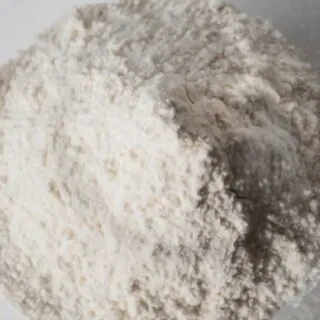
5 Best Self-rising Flour Substitutes to Consider
Ingredients
- 1 – All-purpose Flour Baking Powder, and Salt
- 2 – Whole Wheat Pastry Flour and Baking Soda
- 3 – Spelt Flour
- 4 – Amaranth Flour
- 5 – Biscuit Mix
Instructions
- Choose your preferred substitute from the list of options.
- Organize all of your ingredients.
- Use the proper substitute to cook your recipes.

Carrie is a food writer and editor with more than 15 years of experience. She has worked for some of the biggest names in the food industry, including Bon Appétit, Food & Wine, and Martha Stewart Living.
As the Editor in Chief of IntroChicago.com, Carrie oversees all of the content on the site. She also manages the team of contributing writers and editors, who help to create delicious recipes, helpful tips, and informative articles that you’ll find on the site.
A native of the Chicago area, Carrie is passionate about all things food. She loves trying new restaurants and experimenting with new recipes in her kitchen. She’s also a graduate of the Culinary Institute of America, so she knows a thing or two about food!
